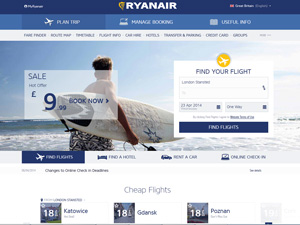Ryanair was back in the news last week but it had nothing to do with angry passengers or their 737’s landing at the wrong airport. They brought a suit against a Dutch screen scraper website called PR Aviation. In a role reversal of sorts, Ryanair found itself on the defensive, instead of being the aggressor, a role they are very comfortable in. In the world of big data, screen scraping can be a useful tactic and is utilized by many companies in the travel world. But what exactly is screen scrapping.
Screen Scraping Defined
Screen scraping as defined by Wikipedia “is a technique in which a computer program extracts data from human-readable output coming from another program.” Basically it is a way of taping into a company’s databases without a direct feed. Screen scraping is viewed by many as a legitimate technique to translate screen data from one application to another. Sometimes it can mean the use of manual or automatic means to harvest content from a website without the approval of the website owner. It can be illegal even though it’s widely viewed as legit technique of data mining.
Ryanair Case
The case was brought forward by Ryanair to the EU Court Of Justice. PR Aviation is defending their right to screen scrape Ryanair’s website. The Court of Justice, in a referral from the Dutch Supreme Court, was asked to determine whether owners of an online database such as Ryanair’s can use contractual restrictions to prevent the copying or use of their databases. The European Commission supported Ryanair’s argument that it is entitled to post terms and conditions on its website that prevent PR Aviation, which runs FlyLowCost.com from screen scraping its database and using it for commercial purposes.
A Ryanair spokesman said: “Ryanair welcomes the EU Court of Justice ruling which confirms that Ryanair can prevent PR Aviation from screen scraping the Ryanair database and using this information for commercial purposes.” Ryanair is clearly very protective of their data and determined to keep online travel companies from accessing it without proper authority.
Scraping Bad or Good for Travel Industry?
The jury is still out and a case can be made for both sides. From the view of Ryanair, screen scraping is bad because their prices for flights are being scraped, giving a competitor an intelligence advantage. Travel companies can collect Ryanairs flights for resale without their consent. Screen scraping can also be time-consuming and expensive to thwart. This is probably why Ryanair, who is extremely protective of their data and one of the few airlines profitable enough to really go after the scrapers.
On the flip side screen scrapers can be a good thing for an airline. Flight statistic companies can scrape an airlines website for schedule and on time performance data. Then use this data to compile flight status notifications and on time reports. If your airline is consistent and runs an on time operation, these reports can create notoriety for the airline. People would rather fly an on time airline than one that is unreliable.
Metasearch company Hipmunk have also been known to be a screen scraper, as they have admitted to the practice. Once a flight search company have scraped enough data and have enough traffic driven to the site they can then go out and partner with a online travel agent. Screen scraping is valuable for metasearchs because without gathering the proper data getting a decision maker at a major travel supplier on the phone is not easy. Finding legitimate channels to acquire supplier data is never easy and can be costly and time consuming, resulting in lost revenue.
What do you think? Should screen scraping be allowed? Time will tell if other airlines join forces to beat back the scrapers and protect their data.



